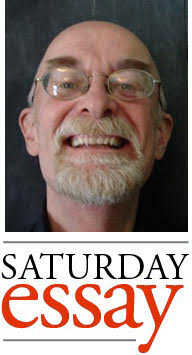One Foot After the Other
 “When you come to a fork in the road, take it.” — Yogi Berra
“When you come to a fork in the road, take it.” — Yogi Berra
Most days after work I pick up my wife and we spring her mom from memory care for a stroll around the block. According to my wife’s high-tech pedometer it’s almost exactly half a mile. There’s a view of the big lake, and the weather that goes with it, and for fifteen minutes or so the three of us are happy to be walking, and walking to be happy.
My dictionary’s third definition of “pedestrian” describes its figurative sense as, “ lacking in interest or imagination; prosaic, ordinary and dull.” While, at speed, the crosstown freeways of Minneapolis may not be dull, they are certainly ordinary, it being lost on us that driving seventy miles an hour is a violent act, and this we only realize when running into something. We could’ve toured as daredevils a hundred years ago. But existence in our rolling cubicles is mostly quite prosaic, and life encaged is dull.
When I was three years old my friend and I decided to walk to the Ashland A&W, a mile away and across an interstate highway. Hudda Martenson saw us traipsing outside the neighborhood, and gave us a ride home to strict punishment. Grounded! For three days! This proved walking was a precious freedom, indeed, whose revocation was a penalty most cruel and severe.
When I was four I had a routine. I’d walk straight for two blocks, turn right for one block, turn right for another, right yet again for another block, then left toward home on the street I began on. This formed the shape of the letter “P,” and I called it my “P-Walk.” On one occasion I carried a paper bag full of hollyhock seeds and handed them out to all takers, knocking on doors with home deliveries. This was long ago, of course, when adults took gifts from strange children.
So I started out walking for pleasure, and then at some point it became walking to get around, and I can’t pinpoint when I started walking for pleasure again. We walked to school from first grade on, funneling into pairs or packs, as mindless as the turning tide, there and back, and there again.
As a young adult I went without a car for about eleven years. Cars were expensive and stressful to own, so mainly I walked. Shanks’ mare travel became an obsession, and what Zen Buddhists call “Beginner’s Mind” was unavoidable while moving forward through space. The moment unfolds and we witness. No need for other planets to see weird shit.
I hike mostly with my wife, laying tracks across the good old days. We’re out there because we can be, and we can because we’re out there. Paths across town become trails out of time, spurs between tomorrow and memory lane.
Walking is of course renown as an aide to meditation in the western sense of the word: pondering, reflecting, thinking deeply. One can walk in this frame of mind without worrying too much about hitting potholes, or taking out a family of four at an intersection. And small worries, being lazy, will fall behind you on the very first hill.
In 1987 I went on a week-long peace walk, traveling 135 miles from Bemidji to the Air Force base in East Grand Forks. The Great Peace March for nuclear disarmament had taken place in 1986, and ours was informally known as the Pretty Good Peace March, starting out with about twenty people, then simmering down to a core group of four. Aside from a bottle thrown from a passing car, and a few indecipherable hoots of derision, we met mainly with waves, and friendly honks from truckers. One night we camped in a municipal campground next to a VFW club. That evening a seventy-six year-old farmer and World War 2 vet came over to talk, and it was a volatile situation, because following him were the other members of his family polka band. With great relief we learned they were fellow travelers, and those two-step peaceniks set up on the grass and played right there, for us — their only audience. What to do, but polka for peace? Then rise the next morning and walk.
Never underestimate the love between a pedestrian and the roadside weeds. What would blur through a windshield, on foot comes into focus as a buzzing, sun-warmed world. We made our way past farms and prairie to East Grand Forks, and our numbers swelled once more. An eight year-old named Dahlia led us onto the base, holding our sign reading, “Walk for Peace, Work for Peace.” The next day, shortly after president Ronald Reagan was shown the front page of the Erskine Echo, with its photo of our fearless mugs behind our fearsome banner, he called for the immediate abolition of nuclear weapons.
Just kidding.
I once walked for a week across the Sierra Nevada mountains of Andalusia. There was a cheap hotel in most every white village, and I followed no schedules, just got up, ate breakfast, and walked. Walked up and onto the stony tracks, among the violets and chamomile, the shepherds and their jangling flocks. I made it to Trevelez, which, due to the properties of the cool mountain air, is renown for its hams, which is saying something in a land of ubiquitous hams, hanging everywhere in tidy rows, talismans of the Reconquest. I found a pensione where the mother of the house pointed to the doorjamb at her side, and a notch therein where hung a cord which, when pulled, unlocked the door to their home. Later, in the restaurant across the street, she cooked potatoes and trout, which were served by her son as her husband poured the beer. Then I crossed the street, unlatched their door most innocent, and slept the sleep of someone who had walked a very long ways.
The Chisos Mountains of west Texas overlook a bend in the Rio Grande, and the trail to the south rim rises until you’re looking over the river and into Mexico across eighty miles of heat and silence. The trail passes oaks, and junipers bejeweled with birds, and agave the size of rose bushes fanning from the boulders. It’s a heck of a slog with a full pack, but that was no detraction. A puma yowled a lullaby, which made for a light night’s sleep. And on my way downhill the next day I brushed a blind prickly pear which left a swatch of thorns, as fine as the hairs on your arm, embedded in my leg. A river-raft guide, sitting next to me at the bar in the Starlight Theatre in Terlingua, told me the remedy, which I’ll pass along to you. As with so many of life’s travails, if a cactus fills your hide with needles too tiny for tweezers, you’ll do well to remember these two important words: duct tape. Hippy-chrome to the rescue. Carry on.
A good walk, if you’re so abled, is always within walking distance. At a leisurely pace individual bricks miraculously appear, along with the crooked stones of this old city, standing straight, plumb and level. Sidewalks lead us crosstown where you never know what’s shaking. If weather permits, that is, if conditions aren’t so severe as to effect the wasting of flesh, a bit of fresh air will redeem you. No need for faraway places, or fall leaves in “peak” colors, it’s all peak, including peak bleak. The flotsam of alleys and artifacts of edge-lands surround us, unseen, until we slow down for a look-see.
Ralph Waldo Emerson said, “In the morning a man walks with his whole body, in the evening, only with his legs.” And walking with my legs like that hints at a day when I’ll be busted and grounded again, not by Hudda Martenson and my parents, but by the entropic agents whittling at my hips and knees, or some other similar indignity, all too soon, too soon. So stay on your pins while you can, kids. We didn’t climb down from the trees and stop dragging our knuckles for nothing. Onward! And beyond. One foot after the other.
Recommended Links:
Leave a Comment
Only registered members can post a comment , Login / Register Here













2 Comments
Helmut Flaag
about 8 years agobhall
about 8 years ago